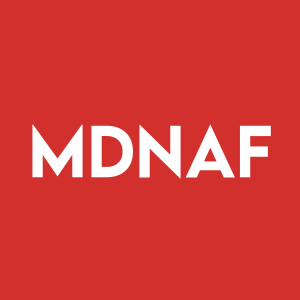Medicenna Presents Compelling Results from the ABILITY-1 Clinical Trial at the 2025 AACR Annual Meeting
Rhea-AI Summary
Medicenna Therapeutics has presented updated clinical data from its ongoing Phase 1/2 ABILITY-1 study of MDNA11, a long-acting IL-2 super-agonist, at the 2025 AACR Annual Meeting. The study shows promising results both as monotherapy and in combination with KEYTRUDA:
- 10 patients achieved objective response (5 confirmed) in advanced/metastatic cancers resistant to immune checkpoint inhibitors
- 36% objective response rate (ORR) achieved in combination therapy
- 29.4% ORR achieved in monotherapy at ≥60 µg/kg dose
- Highest ORR of 50% observed in MSI-H patients and endometrial cancer patients
The treatment demonstrated an acceptable safety profile with over 90% of treatment-related adverse events being Grade 1-2 and transient. Two patients remain tumor-free and off-treatment after 2-3 years. Phase 2 combination dose expansion is now underway with MDNA11 at 90 µg/kg combined with KEYTRUDA.
Positive
- 10 patients achieved objective response with 5 confirmed responses
- 36% objective response rate in combination therapy
- Two patients remain tumor-free after 2-3 years of treatment
- 90% of treatment-related adverse events were only Grade 1-2
- 50% ORR achieved in MSI-H patients and endometrial cancer patients
Negative
- Only 5 out of 10 objective responses were confirmed
- Lower ORR (29.4%) in monotherapy compared to combination therapy
Ten (10) patients have achieved an objective response (5 confirmed) when treated with MDNA11 alone or in combination with KEYTRUDA® (pembrolizumab) – all responders had advanced and/or metastatic cancers with resistance to immune checkpoint inhibitors (ICI) or with historically low responses to ICI
Combination of MDNA11 with KEYTRUDA in the dose escalation arm achieved an objective response rate (ORR) of
Patients from MDNA11 monotherapy dose expansion and dose escalation arms treated at ≥ 60 µg/kg achieved an ORR of
Highest ORR of
Monotherapy arm continues to demonstrate encouraging durability with a melanoma patient and a pancreatic cancer patient remaining tumor-free and off-treatment after entering the study 2 and 3 years ago, respectively
Enrollment in the Phase 2 combination dose expansion arm is underway with the MDNA11 combination Recommended Dose for Expansion (cRDE) established at 90 µg/kg (every 2 weeks) together with KEYTRUDA (400 mg every 6 weeks)
Tumor types being evaluated in the Phase 2 expansion cohorts include MSI-H/dMMR, TMB-H, virally-derived cancers (monotherapy), gynecological cancers (combination) and cutaneous melanoma with (combination) or without primary resistance to ICI (monotherapy and combination arms)
Additional monotherapy and combination data from the ABILITY-1 study expected at future medical conferences throughout this calendar year
TORONTO and HOUSTON, April 28, 2025 (GLOBE NEWSWIRE) -- Medicenna Therapeutics Corp. (“Medicenna” or the “Company”) (TSX: MDNA, OTCQX: MDNAF), a clinical-stage immunotherapy company focused on the development of Superkines targeting cancer and autoimmune diseases, today presents updated clinical data from the ongoing Phase 1/2 ABILITY-1 study evaluating MDNA11 in patients with advanced solid tumors at the 2025 Annual Meeting of the American Association for Cancer Research (AACR) in Chicago, Illinois. MDNA11, a long-acting ‘beta-enhanced not-alpha’ interleukin-2 (IL-2) super-agonist, is being evaluated as a monotherapy or in combination with Merck’s (known as MSD outside of the US and Canada) anti-PD-1 therapy, KEYTRUDA® (pembrolizumab).
“We are encouraged by the anti-tumor activity and safety of MDNA11 in both the monotherapy and combination setting, including the 3 recent responders, particularly in patients who have shown resistance to checkpoint inhibitors or with tumor types with historically low responses to immunotherapies and addressing a vastly underserved cancer population,” commented Fahar Merchant, PhD, President and CEO of Medicenna. “Today’s efficacy and immunodynamic data have provided the foundation to commence the dose expansion portion for MDNA11 in combination with KEYTRUDA. In the monotherapy setting, we continue to see deep and durable single agent activity of MDNA11 with two patients remaining in complete remission and off therapy. Together, these data reinforce the best-in-class potential for MDNA11 as a potent and safe immunotherapy that is poised to transform the existing treatment paradigm for patients with difficult-to-treat tumors. We look forward to sharing additional clinical data from the ABILITY-1 study at future medical conferences this year.”
Key findings from the on-going ABILITY-1 study (data cut-off as of April 15, 2025) include:
Safety Profile
- MDNA11 continues to demonstrate an acceptable safety profile both as a single agent and in combination with KEYTRUDA. Over
90% of treatment-related adverse events (TRAEs) were Grade 1-2 and transient, with no dose limiting toxicities (DLTs) observed with MDNA11 at doses up to 120 µg/kg (Q2W) in monotherapy and in combination with KEYTRUDA (400 mg, Q6W).
Immunodynamics
- Robust expansion of immune effector cells in monotherapy and combination with KEYTRUDA with notable increases in effector (DNAM), ‘stemness-like’ (TCF-1) and memory CD8+ T cells, which are critical for sustained anti-tumor responses.
- Robust, dose-dependent lymphocyte expansion in combination with KEYTRUDA, sustained with repeat MDNA11 dosing, and plateauing at the 90 µg/kg MDNA11 dose level.
Clinical Activity of MDNA11 in Combination with KEYTRUDA during Dose Escalation
Enrollment in the combination dose expansion portion of the ABILITY-1 study is underway having established the MDNA11 combination Recommended Dose for Expansion (cRDE) at 90 µg/kg administered every 2 weeks together with KEYTRUDA administered at 400 mg every 6 weeks.
Encouraging anti-tumor activity continues to be observed with MDNA11 in combination with KEYTRUDA in patients enrolled in the dose escalation portion of the study:
- 5 objective responses (1 CR and 4 PRs) among heavily pre-treated patients, including two previously reported objective responses in historically low immunotherapy responders:
- 70-year-old male with anal squamous cell carcinoma (SCC) who previously progressed on two prior lines of chemotherapy achieved a CR on the first study evaluable imaging scan (week 8); patient continues on combination treatment following a confirmed CR.
- 52-year-old female with TMB-H/MSS colorectal cancer who previously progressed on two prior lines of chemotherapy achieved a confirmed PR. While off-study for 4 months, the patient continues to show deepening of the tumor response in the absence of any treatment.
- Objective response rate (ORR) of
31% (4 of 13) in patients with cancers planned for the Phase 2 combination expansion cohort, including cutaneous melanoma, MSI-H/dMMR, and TMB-H tumors, and an ORR of36% (5 of 14) when including the virally-derived cancers. - Stable disease (SD) in 3 patients for a disease control rate (DCR = CR+PR+SD) of
57% (8/14).
Monotherapy Tumor Response in Immune Checkpoint Inhibitor-Resistant Patients
MDNA11 continues to demonstrate encouraging deep and durable single-agent anti-tumor activity among patients who progressed on prior immune checkpoint inhibitor (ICI) therapy:
- ORR of
40% in the monotherapy dose escalation (treated at ≥ 60 μg/kg) and expansion arm (1 confirmed CR, 1 confirmed PR and 2 unconfirmed PRs) among 10 patients with tumor types currently enrolling in the Phase 2 monotherapy expansion cohort. All patients had previously failed ICI therapy and had advanced and/or metastatic cutaneous melanoma with secondary resistance to ICI or MSI-H/dMMR tumors. Note that the non-melanoma skin cancer cohort is not recruiting as it was replaced with a new cohort of virally-derived cancers subsequent to a protocol amendment. - The ORR is
29.4% from a total of 17 patients when including patients with cancers planned for Phase 2 expansion cohort and patients with primary ICI resistant melanoma who received at least 60 µg/kg of MDNA11 (Q2W). - Overall, objective responses in ICI-resistant patients include 1 CR and 4 PRs
- 2 PRs among 4 MSI-H patients (ORR of
50% ) with both responders having metastatic pancreatic ductal adenocarcinoma (PDAC). - 1 CR and 1 PR among 6 patients with ICI secondary resistant melanoma (ORR of
33.3% ). - 1 PR among patients with ICI primary resistant melanoma.
- 2 PRs among 4 MSI-H patients (ORR of
- Complete resolution of all target and non-target lesions in two patients with on-going remission following end-of-treatment:
- Cutaneous melanoma patient achieved a durable response exceeding 12 months during the study with complete resolution of target and non-target metastatic lesions, and continues to remain off anti-cancer therapy for more than 6 weeks.
- Pancreatic cancer patient (MSI-H) achieved a durable response for 20 months during the study with complete resolution of target and non-target metastatic lesions in the liver including a new lesion treated with MDNA11 following a single cycle of radiation, and continues to remain off anti-cancer therapy for more than 12 months.
- SD in 6 patients for a disease control rate (DCR = CR+PR+SD) of
65% including 2 with duration > 6 months, yielding a clinical benefit rate of41% (7/17).
A copy of the poster and related slide deck has been posted on the “Scientific Presentations” page of Medicenna’s website.
KEYTRUDA® is a registered trademark of Merck Sharp & Dohme LLC, a subsidiary of Merck & Co., Inc., Rahway, NJ, USA.
About MDNA11
MDNA11 is an intravenously administered, long-acting, ‘beta-enhanced not-alpha’ IL-2 Superkine specifically engineered to overcome the shortcomings of aldesleukin and other next generation IL-2 variants by preferentially activating immune effector cells (CD8+ T and NK cells) responsible for killing cancer cells, with minimal or no stimulation of immunosuppressive Tregs. These unique proprietary features of the IL-2 Superkine have been achieved by incorporating seven specific mutations and genetically fusing it to a recombinant human albumin scaffold to improve the pharmacokinetic (PK) profile and pharmacological activity of MDNA11 due to albumin’s natural propensity to accumulate in highly vascularized sites, in particular tumor and tumor draining lymph nodes. MDNA11 is currently being evaluated in the Phase 1/2 ABILITY-1 study as both monotherapy and in combination with KEYTRUDA®.
About the ABILITY-1 Study
The ABILITY-1 study (NCT05086692) is a global, multi-center, open-label study that assesses the safety, tolerability, pharmacokinetics, pharmacodynamics and anti-tumor activity of MDNA11 as monotherapy or in combination with Merck’s anti-PD-1 therapy, KEYTRUDA® (pembrolizumab). In the combination dose escalation portion of the Phase 2 study, patients have been enrolled and administered ascending doses of MDNA11 intravenously in combination with KEYTRUDA. This portion of the study includes patients with a wide range of solid tumors with the potential for susceptibility to immune modulating therapeutics. The combination Recommended Dose for Expansion (cRDE) has been established and the study has commenced combination dose expansion.
About Medicenna Therapeutics
Medicenna is a clinical-stage immunotherapy company focused on developing novel, highly selective versions of IL-2, IL-4 and IL-13 Superkines and first-in-class Empowered Superkines. Medicenna’s long-acting IL-2 Superkine, MDNA11, is a next-generation IL-2 with superior affinity toward CD122 (IL-2 receptor beta) and no CD25 (IL-2 receptor alpha) binding, thereby preferentially stimulating cancer-killing effector T cells and NK cells. MDNA11 is being evaluated in the Phase 1/2 ABILITY-1 Study (NCT05086692) as a monotherapy and in combination with Merck’s anti-PD-1 therapy, KEYTRUDA® (pembrolizumab). Medicenna’s IL-4 Empowered Superkine, bizaxofusp (formerly MDNA55), has been studied in 5 clinical trials enrolling over 130 patients, including a Phase 2b trial for recurrent GBM, the most common and uniformly fatal form of brain cancer. Bizaxofusp has obtained FastTrack and Orphan Drug status from the FDA and FDA/EMA, respectively. Medicenna’s early-stage high-affinity IL-2β biased IL-2/IL-15 Super-antagonists, from its MDNA209 platform, are being evaluated as potential therapies for autoimmune and graft-versus host diseases. Medicenna’s early-stage BiSKITs™ (Bifunctional SuperKine ImmunoTherapies) and the T-MASK™ (Targeted Metalloprotease Activated SuperKine) programs are designed to enhance the ability of Superkines to treat immunologically “cold” tumors.
For more information, please visit www.medicenna.com, and follow us on Twitter and LinkedIn.
Forward-Looking Statements
This news release may contain forward-looking statements within the meaning of applicable securities laws. Forward-looking statements include, but are not limited to, express or implied statements regarding the future operations of the Company, estimates, plans, strategic ambitions, partnership activities and opportunities, objectives, expectations, opinions, forecasts, projections, guidance, outlook or other statements that are not historical facts, such as statements on the therapeutic treatment potential and safety profile of MDNA11 (both as monotherapy and in combination with Merck’s anti-PD-1 therapy, KEYTRUDA® [pembrolizumab]) and the timing and/or release of any additional clinical updates. Drug development and commercialization involve a high degree of risk, and only a small number of research and development programs result in commercialization of a product. Results in early-stage pre-clinical or clinical studies may not be indicative of full results or results from later stage or larger scale clinical studies and do not ensure regulatory approval. You should not place undue reliance on these statements, or the scientific data presented.
Forward-looking statements are often identified by terms such as “will”, “may”, “should”, “anticipate”, “expect”, “believe”, “seek”, “potentially” and similar expressions. and are subject to risks and uncertainties. Forward-looking statements are based on a number of assumptions believed by the Company to be reasonable at the date of this news release. Although the Company believes that the expectations reflected in such forward-looking statements are reasonable, there can be no assurance that such statements will prove to be accurate. These statements are subject to certain risks and uncertainties and may be based on assumptions that could cause actual results and future events to differ materially from those anticipated or implied in such statements. Important factors that could cause actual results to differ materially from the Company’s expectations include the risks detailed in the latest annual information form of the Company and in other filings made by the Company with the applicable securities regulators from time to time in Canada.
The reader is cautioned that assumptions used in the preparation of any forward-looking information may prove to be incorrect. Events or circumstances may cause actual results to differ materially from those predicted, as a result of numerous known and unknown risks, uncertainties, and other factors, many of which are beyond the control of the Company. The reader is cautioned not to place undue reliance on any forward-looking information. Such information, although considered reasonable by management, may prove to be incorrect and actual results may differ materially from those anticipated or implied in forward-looking statements. Forward-looking statements contained in this news release are expressly qualified by this cautionary statement. The forward-looking statements contained in this news release are made as of the date hereof and except as required by law, we do not intend and do not assume any obligation to update or revise publicly any of the included forward-looking statements.
This news release contains hyperlinks to information that is not deemed to be incorporated by reference in this new release.
Investor and Company Contact:
Christina Cameron
Investor Relations
ir@medicenna.com
(647) 953-0673








